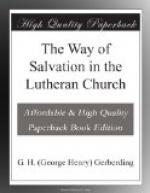Surely a doctrine that changes the words of the institution, wrests and twists them out of their natural sense, and does violence to all sound rules of interpretation that must bolster itself up by the very same methods of interpretation that are used to disprove the divinity of Christ, the resurrection of the body, and the eternity of future punishment, is not the doctrine of Christ.
We have not found the Bible doctrine in any of the views examined. Can we find it? Let us see. We are satisfied, from our examination of the passages that have to do with our subject, that there must be earthly elements present in this sacrament. They are bread and wine. They remain so, without physical change or admixture. We also find from these passages that there is a real presence of heavenly elements. These are the body and blood of Christ. Not indeed that body as it was in its state of humiliation, when it was subject to weakness, hunger, thirst, pain and death. But that glorified, spiritual, resurrection body, in its state of exaltation, inseparably joined with the Godhead, and by it rendered everywhere present. And this body and divinity, we remark in passing, were already present, though veiled, when the God-man walked this earth. Peter and James and John caught a glimpse of it on the Mount of Transfiguration. It is of this body, and blood, of which Peter says, 1 Peter i. 18, 19, that it is not a corruptible thing, and of which the Apostle says, Heb. ix. 12, “By his own blood he entered in once into the Holy Place” (that is, into heaven), and of which Jesus spoke when He said, “Take eat, this is my body ... this is my blood.”
Of this body and blood, the Scriptures affirm that they are present in the sacrament. The passage which sets forth the double presence, that of the earthly and heavenly elements, which indeed sums up and states the Bible doctrine in a few words, is 1 Cor. x. 16. There Paul affirms that the bread is the communion of Christ’s body, not of His Spirit or His influence. If the bread is the communion of, participation in, or connection with His body, then bread and body must both be present. It takes two things to make a communion. They must both be present. It would be absurd to speak of bread as a communion of something in no way connected with it.




